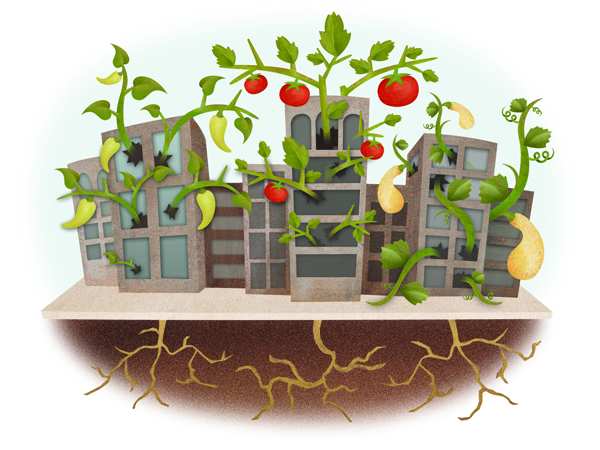 Philly represents at statewide urban farming conference
Philly represents at statewide urban farming conference
by Phil Forsyth
On February 7, over 80 enthusiastic farmers and eaters packed a workshop called Small Space Community Food Production in State College. Lisa Mosca and Sharat Samashekara of Philly Green—a division of the Pennsylvania Horticultural Society—energized the crowd about the possibilities of sustainable agriculture in an urban environment. In the crowd were some of the 120 folks, according to the official count, from Philly and the Southeastern Pennsylvania region that trekked to State College for the Pennsylvania Association for Sustainable Agriculture’s (PASA) Farming for the Future conference. They came from urban farms, farmer’s markets and blogs to learn, network and, of course, eat some great local food.
“Our city is proving to be a big player in sustainable agriculture, and we should be proud of that,” says Jennie Love of local food blog straightfromthefarm.com. In fact, Philadelphia’s urban farms have increased exponentially in the last five years.
PASA is a member-based, sustainable farming organization that works to improve the economic prosperity, environmental soundness and social propriety of our agricultural system. They connect farmers with consumers through initiatives like Buy Fresh Buy Local and Good Food Neighborhood. Its annual Farming for the Future Conference, now in its 18th year, is widely considered the most significant on the East Coast and one of the three most important in the country. The majority of participants are farmers, and Philadelphians would be pleased to recognize so many faces from the tables of our farmer’s markets, like Gina Humphreys of Urban Girls Produce and Tom Culton of Culton Organics. Over 2,000 people attended this year’s conference, including a record 700 first-time participants. Lauren Smith, PASA’s Conference Coordinator, was “especially encouraged to see so many young farmers at the conference.” Given that the median age of farmers in the United States now exceeds 60 years, this is a very good sign for the future of food production in our country.
Keynote speaker Raj Patel, author of Stuffed and Starved—a critique of industrial food production—opened the conference with an engaging and impassioned plea that “food sovereignty” be restored as a fundamental right of all people. The conference featured meals cooked from food grown by member farmers, an agricultural job fair and an awards ceremony honoring the accomplishments of sustainable farmers. The Sustainable Tradeshow filled the halls with almost 80 exhibitors showcasing everything from large-scale farm equipment companies to individual farmers selling their cheeses. Seventy-five workshops were offered on subjects such as “Holistic High-Density Planned Grazing,” “Bugs & Bunnies: How to Outwit Them in the Backyard Garden” and “Solar Electric Systems 201: Basics and Beyond.” The wide variety of topics appealed to a diverse audience, including organic farmers, backyard gardeners, farmer’s market managers, locavores and environmental activists. Despite all these official educational opportunities, most attendees agreed that the most valuable aspect of the conference was actually the learning and socializing that occurs in and around the workshops and other activities. David Siller of Weaver’s Way Farm summed it up: “It’s really the only time all year when farmers can get together and inspire each other.”


